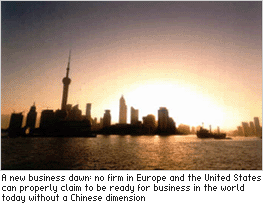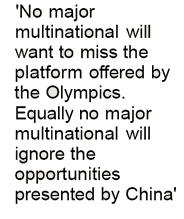
Exciting times
Sir Martin Sorrell, WPP, explains why China is so important to the WPP Group - and so many of its clients
Chinese Olympic athelete Liu Xiang wears his hair in a long, straight fringe and has a chiselled jaw that recalls a young Bruce Lee. Unsurprisingly, he is exceedingly famous in China - appearing on TV singing karaoke and flirting with pretty female presenters; 23-year-old Liu is no slouch on the track, either. He won a gold at the Athens Olympics - to the surprise of many commentators, who had never heard of him - and set a record for the 110 metres hurdles this year in Lausanne. We know this because Nike made him a T-shirt with his world-beating time - 12.88 seconds - emblazoned on the front in red dots.
These days Liu is used to competing with sportsmen from all over the world. But he also races with kangaroos -if you believe a campaign for Visa currently running in China. There he is, in casual clothing, bounding along with a gaggle of enthusiastic marsupials. It is a clever pitch to China's 100 million-plus yuppies, who are fond of holidays in Australia.
Visa and Nike are not the only brands to have signed up Liu's services. He also lends his name and rugged good looks to Coca-Cola, Yili milk and China Mobile phones. All this - and the Beijing Olympics are still almost two years away.
The Games in 2008 will mark a turning point for Liu and China. It will be not just a sporting event. It will be a political, social and economic milestone, too - the year the Chinese economy becomes the second largest market in the world, snapping at the heels of the United States and ahead of Japan.
No major multinational will want to miss the platform offered by the Olympics. Equally no major multinational will ignore the opportunities presented by China. Companies are falling over themselves to be associated with the Games. Take beer. The Olympics normally has one official beer. China, however, is a big country with exceedingly thirsty citizens. So there are three official brews for 2008 -- the local brands Tsingtao and Yanjing, plus America's Budweiser.
This is all exciting news for the global advertising industry, which can look forward to a quadrennial high from the Games. It is also confirmation of something that few now fail to accept - the balance of power in the world is shifting. Wealth is moving from West to East. China is the biggest manifestation of that.
History in reverse
Of course, this is not new; rather it is a case of history reversing itself. In fact, India and China accounted for the same proportion of the world economy in 1825 as they will again in 2025. We have been here before. In the early 19th century, China was the world's paramount industrial power. It dominated the market for high-quality porcelain. Then Wedgwood and Meissen discovered how to produce cheaper, equally high-quality wares that beat the Chinese at their own game - killing off their industry. It signalled the start of western industrial domination that lasted for a century and a half. Now the power is moving again. In time, Chinese- based companies will prove a more potent force than Korea's chaebols or Japanese multinationals.
The US faces the ultimate challenge - when you have a vacuum someone is going to fill it. This is what China is doing and will continue to do. That will be awkward and uncomfortable for Washington.

Of course, there is a long way to go. China's economy is effectively state-directed capitalism and balanced growth is a challenge. The banking system has to develop further and continue to fund the development of state enterprises. The renminbi is still guided by the communist party. Corruption remains widespread. China's banks are burdened by bad debts and obliged to fund state enterprises to find favour with local party bosses. The renminbi is locked in a narrow band against a basket of foreign currencies. It would be a big mistake, however, to assume that these issues cannot be overcome. The Chinese are pragmatic. They believe that their destiny is constantly shifting and they must adapt, asTom Doctoroff explains in his outstanding book Billions.
Also, early suggestions that China's growth is slowing are probably wishful thinking by its rivals. It has an abundant supply of cheap migrant labour. 60% of its citizens live in the country. Indeed, it is calculated that it will still have underemployed workers 30 years from now, even if urbanisation continues at its present pace.
A new business dawn: no firm in Europe and the United States can properly claim to be ready for business in the world today without a Chinese dimension
The effects are already being felt. China's rapacious demand for commodities has pushed up the prices of oil and industrial metals. In particular, its thirst for energy has meant new alliances with Russia and Iran, the first signs that Chinese foreign policy will be informed by its economic needs and not western orthodoxies, however unpalatable that is for Washington.
America is happy to benefit from the low inflation brought by Chinese imports, but is less impressed when China comes knocking at its door. In the first sign of protectionist skirmishes to come, the Chinese state-owned oil company CNOOC last year withdrew from its $18.5 billion. bid for America's Unocal after protests in Congress.
Diligence and education
Can we hope to compete with China? The prognostications are not good. A survey asked people whether they thought working hard was important. Around 2% of western Europeans thought it was, compared with 98% of Chinese. That says it all. The Chinese value diligence and education in a way that is no longer fashionable in the West. Then there is the mountain of regulation and overzealous government in Europe. So if you are going to locate a new factory are you going to do it in Europe -which is a big market with laggardly growth - or China, which has only 4% of worldwide spending but is growing by around IO%? The answer is obvious. The sooner western Europe wakes up, the better.
We have written and talked about the importance of China for two decades. As long ago as 1989 we attended our first WPP board meeting there, travelling up to Guangzhou from Hong Kong and seeing a second railway line being constructed between the two cities. Even then the sheer vitality, power and scale of the country were overwhelming.
WPP now employs 6700 people in more than 13 joint ventures in China that generate nearly $500 million a year. We are now established in the big arenas of advertising, information, consulting, PR and brand identity, healthcare and interactive - accounting for an estimated 15% share of the Chinese advertising services market. We predict that Asia, along with Latin America, Middle East and Africa will be 20% of our business in five years.
Joint ventures

Until recently, it was possible for foreign ad agencies to operate in China only with a local partner. That has now changed under World Trade Organization rules, but it will probably not change our approach. Our joint ventures have been immensely helpful in building our businesses in China and that will continue. Perhaps in the long run we might go to IOO% ownership, but right now having a partner adds value; 50 or 75% can be better than full ownership, because Chinese joint ventures know the market. It would be arrogant to think that we could come into a market and claim to know everything about its 30 or so provinces. This is crucial to doing business in China.
What we see in the growth of India and China as world players is true globalisation. Previously it was Americanisation, whereby large US companies sold their brands abroad exactly as they sold them at home, and American business methods and sensibilities pervaded companies around the world. That is no longer good enough, as Liu Xiang's multiple Olympic campaigns show.
It is extremely hard to read the mindset of 1.3 billion potential consumers. The cultural differences are as great as those between Westerners and Muslims, but because China and its people have long been associated with the West, it is assumed they think like us. Some western companies go in confident that their cultural norms will work in the Chinese market. They assume the way they sell their oil, drinks and cars in the US and Europe will work equally well in the Middle Kingdom. Such an attitude is suicidal. The Chinese are different.
As Tom Doctoroff says, 'Culturally, if not individually, we are moral absolutists and they are relativists. We value social dynamism. They value order. We view history's march as linear. They view it as cyclical, driven by fate. We believe society is 'good'. They believe it corrupts.'
There still exists a lot of snobbery about China. Some scoff that China can make cheap imitations of western goods, but premium brands and the higher creative services will remain exclusively western. That might have been so a decade ago, but it certainly is not now. Chinese advertising in particular is far from derivative. Some of it, Olympic kangaroos included, is exceedingly strong -as good as that produced, say, in Chicago. Advertising creatives in China are adapting rapidly as competition grows. Chinese companies listen and learn. They have huge application and ambition. Equally, Chinese electronics may have begun as an imitation of western brands, but is now seeking to establish its own identity. This represents an opportunity for western creative companies.
No firm in Europe and the United States can properly claim to be ready for business in the world today without a Chinese dimension. Of course, simply having a presence will not be enough and not every company will succeed there. Our attitudes must change. We must be as adaptable as the Chinese, listen and learn from them as they have from us. These are exciting times indeed.